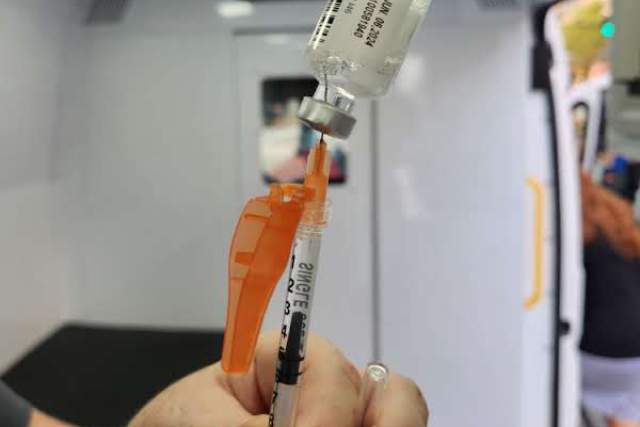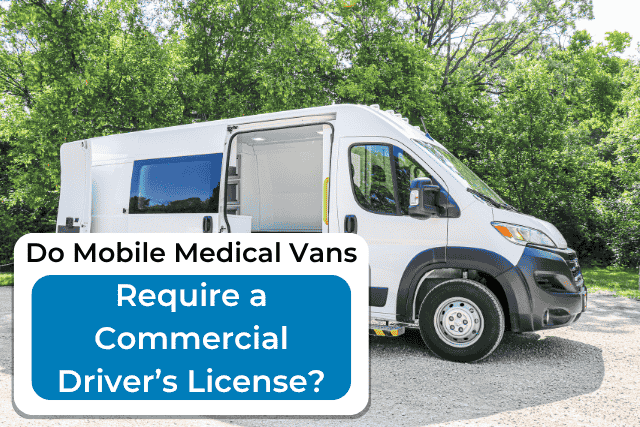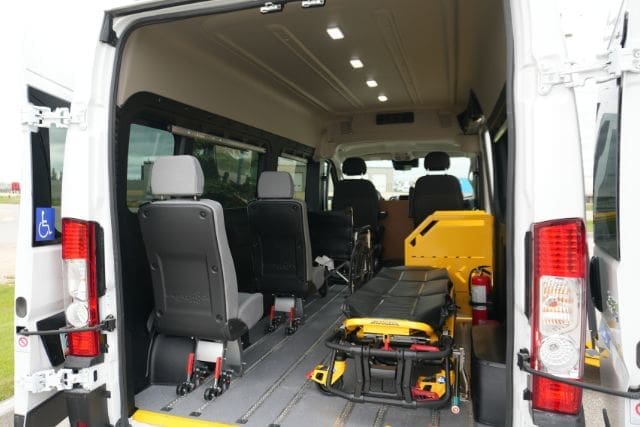One important aspect in the vast landscape of healthcare sometimes goes unnoticed—the accessibility of vaccines. While vaccines play a big role in safeguarding public health, not everyone has equal access to them. Unsurprisingly, traditional clinics experience overcrowding, which sometimes makes it difficult to receive timely vaccines. Some people live far from healthcare facilities, while others simply can’t find the time to get a vaccine.
Mobile vaccine clinics are a game-changer in ensuring that vaccines reach every corner of the United States. These clinics relieve the burdens mentioned above and rapidly deliver vaccines to where they’re needed most. Our team at AVAN Mobility recognizes the barriers surrounding healthcare, and that’s why we’ve been manufacturing mobile medical vans for over a decade.
Organizations like yours across the U.S. use our mobile medical vans to reach people who are struggling with their health. Our approach is simple—a resounding “we can.” There’s no challenge too great when it comes to serving our clients and ensuring that quality healthcare and mobility are within everyone’s reach.
In this article, you’ll learn about what mobile vaccine clinics are. We’ll highlight some of the benefits and discuss how you can use our Mobile Clinic Van for mobile vaccination programs across the country.
Mobile vaccine clinics: What are they and what do they do?
Mobile vaccine clinics are specially designed vehicles equipped to deliver vaccines to various locations across the U.S. These clinics play an important role in expanding vaccine access. They’re helpful for people who face barriers to receiving vaccinations in traditional healthcare settings.
Mobile vaccine clinics are essentially healthcare providers on wheels, carrying out the following essential functions:
Vaccination services: The primary role of mobile vaccine clinics is to administer vaccines. This includes COVID-19 vaccines, flu shots, hepatitis vaccines, and other important immunizations. These clinics are in convenient places, which helps a lot with public health.
Accessibility: Mobile vaccine clinics have a big advantage: they can reach areas in the U.S. with limited access to healthcare. These clinics are a lifeline for residents of remote and underserved communities. They bring essential healthcare services directly to the people who need them most.
Education and outreach: Mobile vaccine clinics are not just about shots. They also offer information and education about vaccines. Their goal is to spread the word about the importance of vaccination, dispel myths, and address any questions people may have. People can make informed decisions about their health when they have accurate information.
Community engagement: Mobile vaccine clinics often engage with local communities and organizations. They form partnerships to ensure that healthcare services are delivered efficiently and effectively. This collaborative approach fosters a sense of community and shared responsibility for public health.
Why mobile vaccine clinics matter
Mobile vaccine clinics are convenient and powerful tools for promoting public health. Here’s why these clinics matter:
Overcoming transportation barriers: Mobile vaccine clinics bring healthcare directly to people. This means they don’t have to travel long distances or navigate complex appointment systems to get the protection they need. Their presence in local neighborhoods makes vaccines more accessible to all.
Equity in healthcare: Health disparities are a pressing issue in the United States. Mobile vaccine clinics are part of the solution. They help bridge the gap in healthcare access by targeting underserved communities and remote areas. This ensures that everyone has an equal opportunity to receive vaccinations.
Convenience: Traditional healthcare facilities often require scheduling appointments well in advance. Mobile clinics offer a more flexible approach. You can go to a mobile vaccine clinic without an appointment, making it more convenient and faster.
Cutting healthcare expenses: Mobile vaccine clinics save money for the healthcare system. How? By preventing diseases through vaccines. It’s much cheaper than treating outbreaks. This not only saves lives but also makes the healthcare system stronger by reducing the pressure on it.
What are Mobile Clinic Vans?
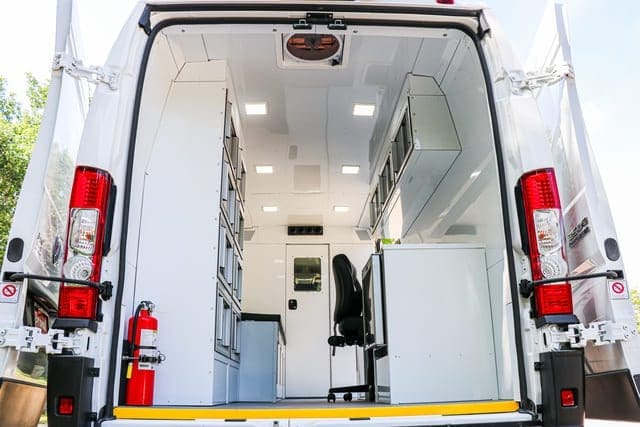
Our Mobile Clinic Van at AVAN Mobility isn’t just a regular vehicle. This versatile healthcare solution is designed to address health disparities, especially in remote and underserved areas. Let’s explore how you can adapt this mobile medical marvel into a mobile vaccine clinic.
Much like mobile vaccine clinics, the Mobile Clinic van is on a mission to reduce health disparities. It does this by bringing healthcare services directly to vulnerable and remote populations. It eliminates the need for patients to travel long distances to get essential medical services. This is similar to how mobile vaccine clinics aim to make getting vaccinated easier.
The Mobile Clinic Van as a mobile vaccine clinic
The Mobile Clinic Van comes equipped with several features that make it an excellent candidate for use as a mobile vaccine clinic:
1. “Doctor’s office on wheels” setup
Turning the Mobile Clinic Van into a mobile vaccine clinic is like setting up a mobile healthcare facility. The “doctor’s office on wheels” setup ensures that vaccines can be administered in a comfortable, clean, and sterile environment.
2. Floor-to-ceiling cabinetry
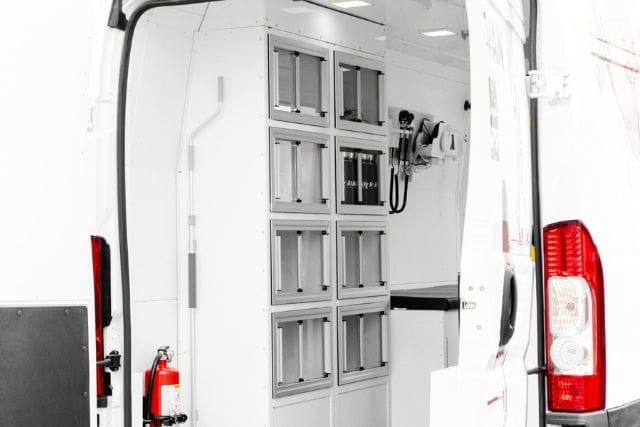
Storage is an important part of mobile vaccine clinics. Vaccines and medical supplies need to be well-organized and easily accessible. The Mobile Clinic Van’s floor-to-ceiling cabinetry offers plenty of space to store vaccines and medical equipment safely. This makes sure healthcare providers have everything they need at their fingertips.
3. Patient bed with under-bed storage
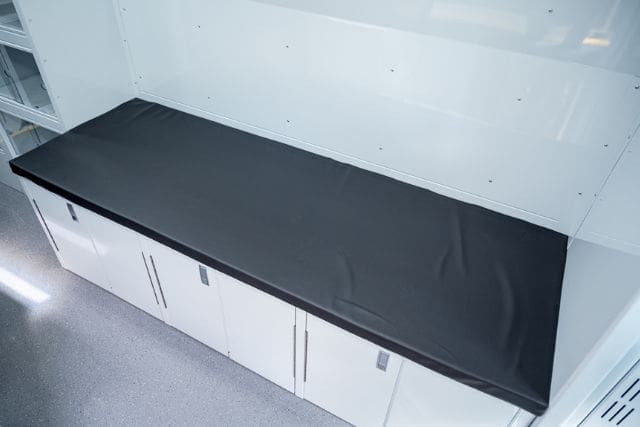
The patient bed in the Mobile Clinic Van is a versatile feature. It provides a comfortable place for individuals to get their vaccinations. It also offers storage space for vaccines and related medical supplies. This ensures that everything is well-organized and close at hand.
4. Rear heat & air conditioning
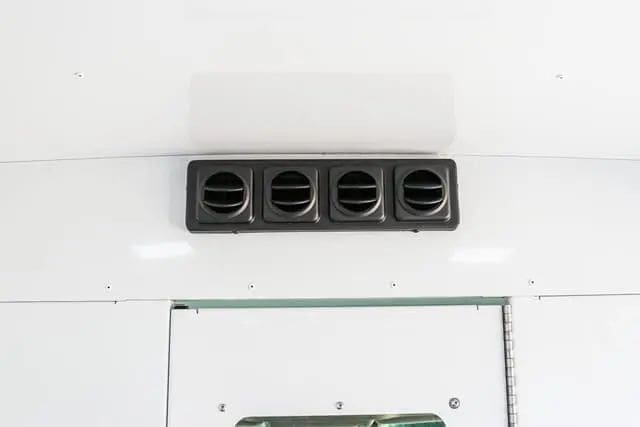
Controlling the temperature is necessary for vaccine storage and patient comfort. The Mobile Clinic Van has rear heat and air conditioning. Patients will stay comfortable during their vaccinations.
5. Clean, comfortable environment
The Mobile Clinic Van provides a clean and comfortable environment for patients. This is crucial for building trust and ensuring that individuals feel at ease during the vaccination process. This can help overcome vaccine hesitancy.
6. Power supply
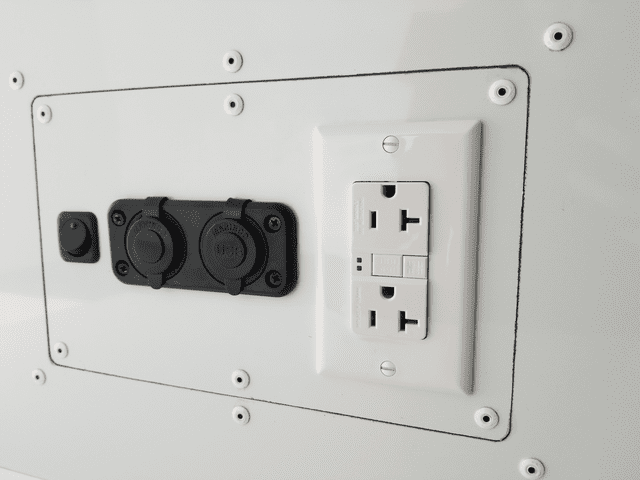
Mobile vaccine clinics need power to operate equipment, store vaccines, and keep records. The Mobile Clinic Van’s power supply includes regular outlets, 12V plugs, and USB ports. It ensures that all necessary tasks can be done smoothly, guaranteeing the efficient delivery of vaccines.
7. Fridge and sink

The Mobile Clinic Van also comes with the option for a fridge and sink. Having a fridge for vaccine storage and an integrated sink is important for mobile vaccine clinics. It makes sure vaccines stay at the correct temperature. Healthcare providers can wash their hands in the sink properly during vaccinations. These features are essential for the success of vaccination programs.

What locations in the U.S. could benefit from a mobile vaccine clinic?
Take a glimpse at the chart below for an idea of which areas of the U.S. could benefit from a mobile vaccine clinic.
| Remote Area | Location/Region | Characteristics | Reasons for Mobile Vaccine Clinic |
| Rural Appalachia | Appalachian Region | Sparse population, limited healthcare facilities | Overcoming geographic barriers, increasing vaccination accessibility |
| Navajo Nation | Arizona, New Mexico, Utah | Isolated, underserved populations | Providing healthcare access and culturally appropriate vaccination |
| Hawaiian Islands | Hawaii | Limited healthcare infrastructure | Ensuring remote populations receive vaccines |
| Northern Maine | Aroostook County | Inaccessible due to terrain | Overcoming geographical challenges for vaccination delivery |
| Western Texas | Big Bend Region | Limited medical resources, vast areas | Expanding healthcare access in sparsely populated regions |
| Gulf Coast | Coastal Regions in Mississippi, Louisiana | Vulnerable to hurricanes, hurricanes | Rapid response for disaster relief and vaccinations |
The road ahead with AVAN Mobility
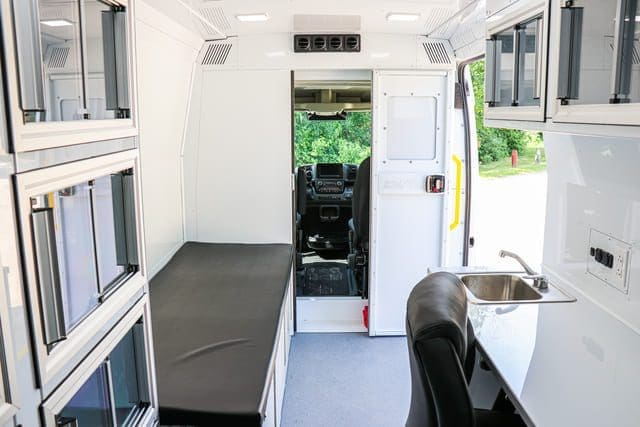
You found this article while looking for more information on mobile vaccine clinics in the U.S.
If you’ve made it this far, you now have a better idea of what mobile vaccine clinics are and how they benefit people around the country. You also learned that you can use our Mobile Clinic Van as a mobile vaccine clinic.
At AVAN Mobility, we don’t like seeing barriers getting in the way of proper healthcare. That’s why we’re so adamant about manufacturing state-of-the-art mobile medical vans so organizations like yours can use them to help people in need.
Since you’re still researching mobile vaccine clinics, you should read our article on what can be installed in a Mobile Clinic Van.
You’re probably also interested in how to secure funding for one of these vehicles. Read our article on the top 10 tips for fundraising for a Mobile Clinic Van for more information on that.
